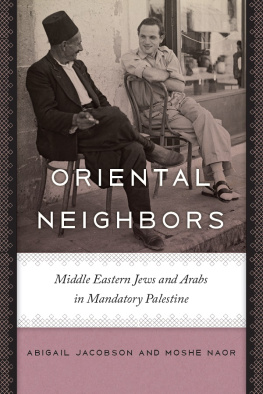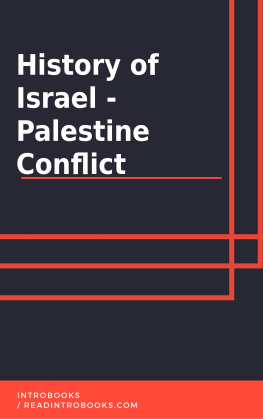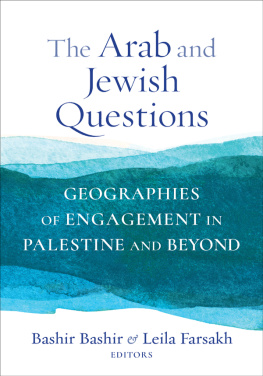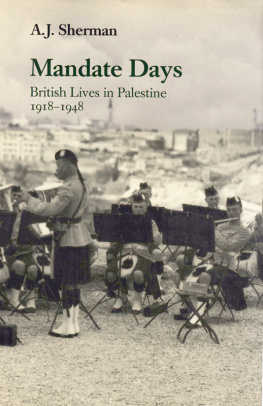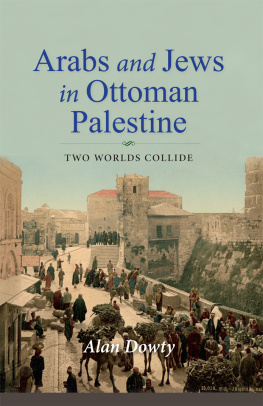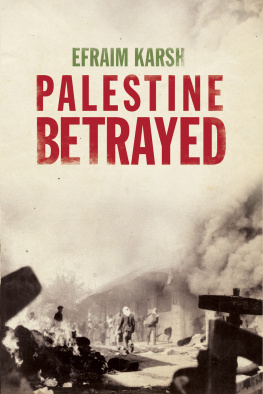Jacobson Abigail - Oriental neighbors: Middle Eastern Jews and Arabs in mandatory Palestine
Here you can read online Jacobson Abigail - Oriental neighbors: Middle Eastern Jews and Arabs in mandatory Palestine full text of the book (entire story) in english for free. Download pdf and epub, get meaning, cover and reviews about this ebook. City: Palestyna;Waltham, year: 2017, publisher: Brandeis University Press, genre: Politics. Description of the work, (preface) as well as reviews are available. Best literature library LitArk.com created for fans of good reading and offers a wide selection of genres:
Romance novel
Science fiction
Adventure
Detective
Science
History
Home and family
Prose
Art
Politics
Computer
Non-fiction
Religion
Business
Children
Humor
Choose a favorite category and find really read worthwhile books. Enjoy immersion in the world of imagination, feel the emotions of the characters or learn something new for yourself, make an fascinating discovery.
- Book:Oriental neighbors: Middle Eastern Jews and Arabs in mandatory Palestine
- Author:
- Publisher:Brandeis University Press
- Genre:
- Year:2017
- City:Palestyna;Waltham
- Rating:3 / 5
- Favourites:Add to favourites
- Your mark:
- 60
- 1
- 2
- 3
- 4
- 5
Oriental neighbors: Middle Eastern Jews and Arabs in mandatory Palestine: summary, description and annotation
We offer to read an annotation, description, summary or preface (depends on what the author of the book "Oriental neighbors: Middle Eastern Jews and Arabs in mandatory Palestine" wrote himself). If you haven't found the necessary information about the book — write in the comments, we will try to find it.
A fresh look at Jewish-Arab relations in Palestine under the British Mandate
Jacobson Abigail: author's other books
Who wrote Oriental neighbors: Middle Eastern Jews and Arabs in mandatory Palestine? Find out the surname, the name of the author of the book and a list of all author's works by series.
Oriental neighbors: Middle Eastern Jews and Arabs in mandatory Palestine — read online for free the complete book (whole text) full work
Below is the text of the book, divided by pages. System saving the place of the last page read, allows you to conveniently read the book "Oriental neighbors: Middle Eastern Jews and Arabs in mandatory Palestine" online for free, without having to search again every time where you left off. Put a bookmark, and you can go to the page where you finished reading at any time.
Font size:
Interval:
Bookmark:


Acknowledgments

This book is the culmination of almost five years of collaborative work, which crossed oceans and continents and involved many people and institutions. The research and writing about the complex relations between Oriental Jews and Arabs in Mandatory Palestine began in a period of emerging hopes for historic change in the Middle East. The book developed in parallel to the great vicissitudes in the Arab world, as relations between Jews and Arabs in Israel deteriorated. In many ways, our geographical distance from Israelliving as we did in Boston, Massachusetts, and San Diego, California, during these yearsenabled us to write with some emotional distance. This intellectual and scholarly effort, which was also a personal journey that engaged our own identities, was made possible through the support of many colleagues, friends, and institutions, to which we would like to extend our deep gratitude here.
First and foremost, we take this opportunity to express our gratitude and friendship to Tammy Razi at Sapir Academic College, who was involved in all stages of this research, from its very early phases until it was consolidated into a book. We are indebted to Tammy for her work and effort, as well as her scholarly acumen, wisdom, and enthusiasm. Her advice and suggestions inspired us and are apparent throughout the book. We were also fortunate to have wonderful research assistants. We would first like to thank our main research assistant, Dotan Halevy, for his dedication to this project, his enthusiasm and curiosity, and his superb analytical skills. This study could not have been accomplished without Dotans considerable contributions. We wish him every success in the new phase of his academic journey as a PhD candidate in the Department of History at Columbia University. We also want to recognize and thank our two other very dedicated research assistants, Eli Osherov in Jerusalem and Mano Sakayan in Boston, who helped us tremendously in the latter stages of writing the book. Special thanks go to our translator and editor Shaul Vardi, for his painstaking work and his valuable contribution to this effort.
Several institutions supported and facilitated the research and writing of this book. We are grateful for the generous research grants and financial support that we received from the Center for the Study of Relations between Jews, Christians, and Muslims at the Open University in Israel; the Israel Institute in Washington, D.C.; the Schusterman Center for Israel Studies at Brandeis University; Sapir Academic College in Israel; the Deans Fund for Professional Development at the School of Humanities, Arts, and Social Sciences of the Massachusetts Institute of Technology (MIT); the Younes and Soraya Nazarian Center for Israel Studies at the University of California, Los Angeles (UCLA); and the Faculty of Humanities and the Department of Israel Studies at the University of Haifa. We also thank the many archivists and librarians who helped us as we conducted research for this book.
The editors at Brandeis University Press and the University Press of New England offered us continuous support and good advice. Sylvia Fuks Fried, the director of Brandeis University Press, was among the first advocates of this project, always willing to share her wisdom and available for a phone conversation or meeting. We would also like to thank Phyllis D. Deutsch, the editor in chief at the University Press of New England, for believing in this collaborative undertaking from its early stages and for providing guidance through the writing and review. We thank Ilan Troen at the Schusterman Center for Israel Studies at Brandeis University, for his insights and support, as well as the three anonymous readers who read the manuscript with a critical eye and whose suggestions were much appreciated.
Parts of the book were presented at various conferences and academic workshops. The comments and ideas we received there were invaluable and advanced our thinking in many ways. We have presented papers at numerous meetings of the Association for Jewish Studies, the Middle East Studies Association, and the Association for Israel Studies, as well as at the annual conference of the Center for the Study of Relations between Jews, Christians, and Muslims at the Open University in Israel. We would also like to thank the participants and commentators at two international workshops: Jewish Thought in Arab Societies (Ben-Gurion University, 2013), and German Orientalism and the Jewish Arab Question: On the Study of Arabic Language and Culture in the Jewish Community in Mandatory Palestine (Hebrew University of Jerusalem, 2015).
Coauthoring this book was a new and exciting challenge for both of us. Writing a book together is rarely an easy task, and we are delighted that it was such a meaningful experience for us, both as scholars and individuals. Our ongoing exchange of ideas during the writing of different drafts of this book has enriched us and, we hope, has begun to narrow the gap between the disciplines of Israel and Jewish Studies on the one hand and Middle Eastern Studies on the other hand. Writing this book was a joint effort, and we both contributed equally to it. We should also mention here that our names appear on the cover of the book in alphabetical order.
At the end of this journey, we are pleased to recognize and thank many friends and colleagues. Gur Alroey, Moshe Behar, Zvi Ben-Dor Benite, Hedva Ben-Israel, Michelle Campos, Yigal Elam, Yuval Evri, Israel Gershoni, Jonathan Gribetz, Liora Halperin, Liat Kozma, Jessica Marglin, Roberto Mazza, Yonatan Mendel, Derek Penslar, Yona Sabar, Eugene Sheppard, Amy Singer, Reuven Snir and David Tal were always interested in our work and offered helpful comments and suggestions at different stages of its development. Special thanks go to Hagit Lavsky for her careful reading of the manuscript and her important suggestions. Needless to say, any errors are ours alone.
The History Department at MIT was Abigails academic home for four years, and special thanks go to Lerna Ekmekcioglu for many conversations and fruitful exchanges, as well as to Craig Wilder, Jeff Ravel, Mabel Chin Sorett, Margo Collett, and Chuck Munger for their support and friendship. At the early stages of writing this book, Abigail was a junior research fellow at the Crown Center for Middle East Studies at Brandeis University, where she wishes to thank especially Shai Feldman and Naghmeh Sohrabi. Thanks are also due to the Department of Israel Studies at the University of Haifa, Moshes new academic home; the Jewish Studies Program at York University, in Toronto, especially Kalman Weiser; Risa Levitt Kohn, of the Jewish Studies Program at San Diego State University, and Maura Reznik, of the Nazarian Center for Israel Studies at UCLA.
Abigail thanks her friends in Boston who provided love, wisdom, and support and made her feel she had a home away from home: Noga Ron-Harel and Tal Harel, Gal Kober and Aaron Shakow, Sarit and Rotem Bar Or, Rebecca Weitz-Shapiro and Daniel Shapiro, Avital and Oren Parnas, Hila Milo Rasouly and Aviram Rasouly, Michal and Uri Sheffer, and Michal Ben Joseph Hirsch. Orli Fridman, Noya Regev, Rivka Neriya Ben Shahar, Naomi Davidson, Varda Halabi-Senerman, Tami Katzir, and Hadas Shintel remain dear and loving friends, even from afar.
This book could not have been written without the endless love and support of our families. Abigails parents, Cheli and Dani Jacobson; her sister Noa; and the memory of Moshes late parents, Angela and Sabri, served as inspiration as we wrote this book. Rachel and Avner shared this journey with us at all times, and their love and patience helped us complete the project. Our daughters, Alona and Naomi, were born during the writing of this book. It is our hope that the Middle East in which they will grow up will be different than ours. It is to our children, Alona, Yehonatan, and Naomi, that we dedicate this book.
Next pageFont size:
Interval:
Bookmark:
Similar books «Oriental neighbors: Middle Eastern Jews and Arabs in mandatory Palestine»
Look at similar books to Oriental neighbors: Middle Eastern Jews and Arabs in mandatory Palestine. We have selected literature similar in name and meaning in the hope of providing readers with more options to find new, interesting, not yet read works.
Discussion, reviews of the book Oriental neighbors: Middle Eastern Jews and Arabs in mandatory Palestine and just readers' own opinions. Leave your comments, write what you think about the work, its meaning or the main characters. Specify what exactly you liked and what you didn't like, and why you think so.

